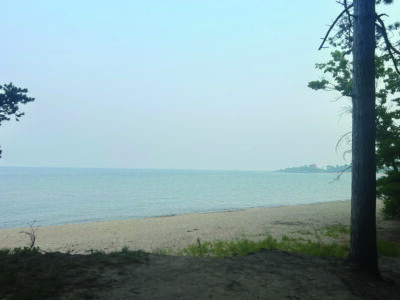Grant testimonies for western U.P. presented in state government
LANSING — Western U.P. leaders and representatives provided testimony in support of a $50 million state grant request on Wednesday.
The Michigan House’s Labor and Economic Appropriations Subcommittee held a hearing on Wednesday morning for a review of legislatively directed spending items submitted by members of the Michigan House of Representatives. The requested grant, sponsored by Rep. Greg Markkanen (R-Hancock) and cosponsored by Rep. Dave Prestin (R-Cedar River) and Rep. Karl Bohnak (R-Deerton), would be awarded to Wakefield Township if approved.
“We’re requesting a 50 million dollar grant for Wakefield Township to help us lay groundwork for sustainable economic opportunity in the U.P.,” said Rep. Prestin during Wednesday’s hearing. “This funding will enable us to attract businesses, ensure capital investment that currently bypass(es) our region due to aging or insufficient infrastructure. Our ask is straightforward. We are requesting public dollars for public infrastructure for a public body, improvements that benefit everyone.”
If awarded, the dollars would be used for infrastructure improvements to attract new industries and employers to the area, such as the Copperwood Project by Highland Copper, by investing in road upgrades, power grid fortifications and telecommunications improvements. This does not mean that the Copperwood Project would receive these funds, but the funds would be used to create infrastructure improvements that new employers, like the Copperwood Mine, could build upon.
“We are asking for this 50 million dollar investment in public infrastructure, not because we want a handout, but because we know our region is worth the investment,” said Wakefield Township Supervisor Mandy Lake, who has publicly supported the project in a video posted to the Copperwood Project’s website. “At the request of U.P. legislators, Wakefield Township would proudly serve as the grant administrator and these funds would be used wisely to meet urgent infrastructure needs of our community with long-term returns for the whole region.”
Lake went on to explain that the grant would also help advance the Copperwood Mining Project, which she called a “generational opportunity” for the region.
“Mining is a part of our history, and it should be a part of our future. It’s a vital piece of the U.P.’s economy and enjoys broad local support,” Lake added.
The issue of the Copperwood Project has been hotly contested across the Upper Peninsula, with a major source of opposition stemming from the potential environmental effects that building the mine could have.
“Copperwood will maintain the strictest environmental standards that will enable Copperwood to minimize and mitigate environmental impact. Copperwood has a non-acid-generating ore body, meaning it is incapable of producing acidic runoff that would adversely affect the environment and the health of people or animals,” says Highland Copper on the Copperwood Project’s website. “The project will not draw water from Lake Superior. Copperwood is an underground mine allowing for a modest surface footprint. Highland Copper, Copperwood’s parent company, has created 19 new acres of wetland on site and will preserve 717 acres in perpetuity.”
Highland Copper also says that Copperwood is not permitted to mine underneath the Porcupine Mountain State Park.
“Of course we love our land, our waters and our natural beauty here. Every person who supports this investment does so with deep respect for the environment as we live here, we hunt here, we fish here, we are avid outdoorsmen here,” explained Lake. “We’re fortunate to live in the U.P. and call it our home. Therefore, we feel just as strongly as everybody else on maintaining an environmental and economic equilibrium. Michigan’s mining laws are among the strongest in the world that were passed with bipartisan support during divided government – a reminder that when we work together, we can achieve environmental and economic responsibility.”
Lake also said that economic analysis projects that the return tax revenue to state and local governments will far exceed the $50 million that is being requested, as dollars will be reinvested in the region and help build a self-sustaining economic future.
Alexandra Leonard, a representative for Protect the Porkies – a coalition of volunteers who oppose and resist development of the Copperwood Project – encouraged committee members to be mindful of the balance between economic and environmental prosperity during her testimony against approval of the grant.
“I recognize the arguments here about how infrastructure upgrades are important to the U.P. However, I think we need to be really mindful of how we do it. I don’t think that mining is it. It creates enormous environmental hazards. This tailings dam would be within regulation, but would be designed for 100-year storms, and there have been two 1,000-year storms in the last decade alone,” explained Leonard. “The Great Lakes are one of the largest sources of fresh water in the world, and I think we need to be really, really mindful to protect that.”
Jane Fitkin, Director of Citizens for a Safe & Clean Lake Superior, also testified against awarding the grant, citing public resistance to the Copperwood Project and a Michigan Economic Development Corporation’s Strategic Outreach and Attention Reserve grant for Highland Copper that has been halted twice in the Senate Appropriations Committee.
“I’m here today to testify on behalf of, as Alexandra said, the over 465,000 petition signers, 213 residents of Gogebic and Ontonagon counties, and over 80 organizations to urge to reject any public funding to aid the Copperwood Mine, especially the request before you today. This request, I want to note, is nearly identical to a MEDC SOAR grant to Highland Copper that has been halted twice now in the Senate Appropriations Committee due to massive public opposition and it being an inappropriate use of taxpayer money,” shared Fitkin. “There is no reason to approve it now. This request, despite what proponents may say, has a sole foreign corporate beneficiary – Highland Copper – which is a Canadian company who has never developed a mine before, who has been trying for 15 years and failing to raise private funds for the Copperwood Mine, which would be the closest sulfide mine to Lake Superior ever built. While copper continues to remain off of the (USGS) Critical Mineral List, and thus have no true urgency to mine, Highland Copper wants to use our taxpayer money in Michigan as an endorsement to spur additional funding to build the mine, which they don’t currently have. Proponents will tell you that there is universal local support for this project, and that is simply not true.”
The committee did not make any decisions during the meeting, and adjourned following the testimonials regarding the $50 million grant.
The full committee meeting can be viewed online at youtube.com/live/jnv1HdBjskw?si=_9VvCi1zg0HhYVrP, with the section regarding the Wakefield grant beginning at 5:04:28.
More information about the Copperwood Project can be found online at copperwoodproject.com. More information about Protect the Porkies and Citizens for a Safe & Clean Lake Superior can be found on their respective websites at protecttheporkies.com/home and citizensforsuperior.org.
Abby LaForest can be reached at 906-228-2500, ext. 548. Her email address is alaforest@miningjournal.net.


